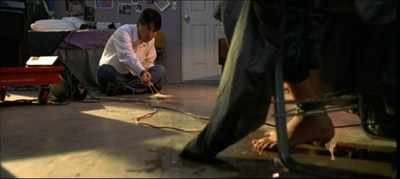Anyone even remotely aware of Korean cinema understands that the theme of revenge is commonplace. There are, of course, a great number of socio-cultural reasons as to why vengeance is prevalent. Historically, Japan has brutally colonised Korea several times over the past few centuries. Following the Second World War, the then-military government oppressed the people until an uprising forced change. Then, after a democratic capitalist government took power, the race to catch up with ‘Western’ countries divided the rich and poor to an even greater degree, with traditional values altered and livelihoods destroyed in order to create infrastructure. The theme of revenge is dominant as it undoubtedly provides catharsis for a nation of people whose identity has been in a constant state of instability due to external factors beyond their control.
Director Park Chan-wook (박찬욱) explores such notions of revenge in his infamous ‘Vengeance Trilogy’ beginning with Sympathy for Mr. Vengeance (복수는 나의 것), and followed by Old Boy (올드보이) and Lady Vengeance (친절한 금자씨) respectively.
Sympathy for Mr. Vengeance is concerned not only with revenge but the very basis and cyclical nature which it evolves into. Ryu (Sin Ha-gyoon (신하균) is deaf and mute, and lives a meager existence working in a factory. His sister (Lim Ji-eun 임지은) suffers from kidney disease and is in urgent need of a transplant. Fired from his job and distressed that his sister may die, Ryu turns to the black market and strikes a deal – he will give all his money and donate his own kidney, and in exchange he will receive a healthy kidney for his sister. Yet, when Ryu wakes up after the operation, he finds his kidney, and his money, have been stolen. Worse still, thanks to a miraculous donation a kidney is now available at the hospital, but without his savings the operation cannot commence.
Desperate, Ryu and his anarchist girlfriend Cha Yeong-mi (Bae Doona (배두나) scheme to kidnap the daughter of his former boss Park Dong-jin (Song Kang-ho (송강호) for ransom. With the transplant money secure, the duo plan to release the girl and restore the equilibrium; yet when Ryu’s sister discovers the plot she cannot take the shame and burden, and commits suicide. Ryu and the boss’s daughter bury her body by a riverbank, but the youngster falls into the water and drowns. Sympathy for Mr. Vengeance then evolves into two separate narratives of revenge; Ryu’s quest to hunt down the black market organ dealers, and Dong-jin’s desire for vengeance over his dead daughter. Each man has lost someone special, someone who helped to define their identity and give them purpose and subsequently, as each man follows his agenda, their humanity becomes lost amid their barbarous acts of vengeance. Both Ryu and Dong-jin are good men, but are transformed into murderers due to external economic and medical forces, adding sympathy and poignancy as they lose their identity with each act of violence. The evolution of the protagonists are superbly conveyed by Sin Ha-gyoon and Song Kang-ho (송강호), the latter in particular giving a towering performance transforming from emotional businessman to hardened killer. Neither man understands the futility of their vengeance nor that the escalation of violence produces more victims that demand justice.
The evolution of the protagonists is masterfully constructed by director Park Chan-wook, who expertly composes each shot to reinforce the sympathy, and the insanity, of their actions. The cinematography is incredible in places, particularly in the recurrence of aerial shots that emphasize the loneliness of the men and the fragility of their humanity. Additionally, the utilisation of space and depth of field highlights their terrible position, both literally and figuratively, in horrific environments and circumstances. Ryu’s world is conveyed effectively and dramatically due to his inability to hear, as alternating POV shots establish how silent and disadvantaged his world is compared to those around him adding yet another layer of compassion to his predicament. Park Chan-wook’s presentation of violence is thoughtful and initially restrained, gradually building tension in order for graphic scenes to have the utmost impact.
Verdict:
Sympathy for Mr. Vengeance is a fascinating exploration into the nature of revenge and violence, highlighting how two seemingly ‘good’ men can evolve into psychotic killers when they are bereaved. However, further exploration of the socio-economic problems that created the black market organ trade and the lay-offs at the factory, could have enhanced the poignancy of their predicaments further, as would have additional characterization before the crises developed. Yet despite this, Sympathy for Mr. Vengeance is a riveting and emotionally charged debate on the escalation and futility of vengeance, and how the loss of a loved one can become poison when the path of revenge is taken.
★★★★☆




